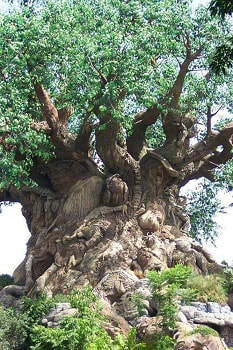Tree, Trust, Truth
 The words tree, trust, and truth all have their origin in the Proto-Indo-European (PIE) root deru (to be firm, solid, steadfast).
The words tree, trust, and truth all have their origin in the Proto-Indo-European (PIE) root deru (to be firm, solid, steadfast).Consider the thought that trees, trust, and truth all begin as seeds from which they grow and develop and mature over the years.
The word tree has its origins in PIE deru and Old English treo, treow (tree). The Old English word for a woodworker or carpenter was treowwyrhta (treewright).
The noun trust and the verb ‘to trust’ have their origins in PIE deru and Old English treowian (to believe, trust) and treowe (faithful, trusty). The word trust (reliance on the veracity, integrity, or other virtues of someone) came to English in the 13th century. In the 14th century, the word trust also meant reliability, trustworthiness, fidelity, faithfulness, and confident expectation. In the 15th century, the word trust took on legal connotations; e.g., property or goods held ‘in trust’ or ‘entrusted’ to another.
The word truth has its origins in PIE deru, Proto-Germanic treuwaz (characterized by good faith), and Old English treowd (faith, faithfulness, fidelity, loyalty, veracity, the quality of being true). The Old English word for ‘true love’ is treowlufu (love that is as steadfast as a tree). Such origins suggest that truth is something in the heart rather than the head; something that you do rather than something that you have.
Truth, meaning accuracy or correctness, is from the 1560s.
Interestingly, English and other PIE languages have the verb ‘to lie’ (to tell an untruth) but there is no verb meaning ‘to tell the truth’. That is, English speakers can ‘lie’ about something but they can not ‘truth’ about something!
Reference: Online Etymological Dictionary, https://www.etymonline.com/
Published on July 03, 2022 13:22
No comments have been added yet.



